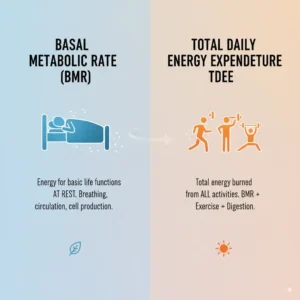Learn How Many Calories You Burn Every Day
Calculate your Basal Metabolic Rate (BMR) and Total Daily Energy Expenditure (TDEE) to achieve your fitness goals
Your Information
Your Results
Basal Metabolic Rate
0 calories
Calories your body needs at rest
Total Daily Expenditure
0 calories
Calories you burn daily
Your Calorie Goals
Weight Loss
0.5 kg (1.1 lbs) per week
0 calories
Maintenance
Keep your current weight
0 calories
Weight Gain
0.5 kg (1.1 lbs) per week
0 calories
Nutrition Tips
- Focus on protein-rich foods to maintain muscle mass
- Stay hydrated - drink at least 8 glasses of water daily
- Combine cardio and strength training for best results
- Get 7-9 hours of quality sleep each night
Calculate Your Calories
Enter your information and click "Calculate" to see your personalized results
Calculate Your Daily Calorie Burn with Our Easy Tool!
Ever wondered exactly how many calories your body uses in a day? Understanding your daily calorie burn is a crucial step towards achieving your health and fitness goals, whether you’re looking to lose weight, maintain it, or even gain muscle. And now, with our intuitive web tool, calculating this vital number has never been easier!
Why Calculate Your Daily Calorie Burn?
Knowing your daily calorie expenditure provides a roadmap for your nutrition. It helps you:
Weight Management: Create a calorie deficit for weight loss, maintain your current weight, or plan a surplus for muscle gain.
Optimal Fueling: Ensure you’re providing your body with enough energy for daily activities and workouts.
Personalized Planning: Move beyond generic advice to a plan tailored specifically for you.
Understanding BMR and TDEE
At the heart of calorie calculation are two key terms:
Basal Metabolic Rate (BMR): This is the minimum number of calories your body needs to perform basic, life-sustaining functions at rest, such as breathing, circulation, and cell production. Think of it as the energy required just to exist.
Total Daily Energy Expenditure (TDEE): This is your BMR plus the calories burned from all other activities throughout your day, including digestion (thermic effect of food), exercise, and non-exercise activity thermogenesis (NEAT – things like fidgeting, walking, and standing). Your TDEE is the number you really want to know!

How Our Calorie Calculator Works
Our user-friendly tool takes the guesswork out of the equation. You simply input a few key pieces of information:
Your Age: Metabolism tends to slow slightly with age.
Your Gender: Men generally have higher muscle mass and thus a higher BMR than women.
Your Height and Weight: These factors directly influence your body’s energy requirements.
Your Activity Level: This is crucial! From sedentary to very active, your daily movement significantly impacts your TDEE.
Based on these inputs, our calculator utilizes scientifically validated formulas (like the Mifflin-St Jeor equation for BMR, and then applies activity multipliers) to provide you with an accurate estimate of your daily calorie burn.
Setting Calorie Goals for Weight Management
Once you have your TDEE, you can set effective calorie goals:
Weight Loss: To lose approximately 1 pound per week, aim for a deficit of 500 calories per day from your TDEE.
Weight Maintenance: Consume roughly your TDEE in calories.
Weight Gain (Muscle): Aim for a surplus of 250-500 calories per day above your TDEE, coupled with a strength training program.
Factors That Affect Your Metabolic Rate
While our calculator provides a solid estimate, it’s good to be aware of other factors that can influence your metabolism:
Muscle Mass: More muscle burns more calories at rest than fat.
Genetics: Some people are naturally predisposed to a faster or slower metabolism.
Hormones: Thyroid hormones, for instance, play a significant role.
Environmental Temperature: Your body burns more calories to maintain its temperature in very cold or very hot conditions.
Nutrition: Certain foods and macronutrient ratios can slightly influence metabolism.
Tips for Accurate Calorie Calculation
Be Honest About Activity: Overestimating your activity level is a common mistake. If in doubt, choose a slightly lower activity multiplier.
Update Regularly: As your weight, activity level, or age changes, re-calculate your calorie burn for the most accurate results.
Use as a Guide: Remember that these are estimates. Your actual calorie burn can vary slightly day-to-day. Listen to your body and adjust as needed.
Frequently Asked Questions
Q1: How often should I re-calculate my daily calorie burn?
A1: You should re-calculate your calorie burn whenever there’s a significant change in your weight (more than 5-10 pounds), activity level, or every few months to ensure accuracy.Q2: Can I trust online calorie calculators?
A2: Reputable online calculators, like ours, use established scientific formulas and can provide a very good estimate. However, they are still estimates, and individual variations can occur.Q3: What if my calculated calorie goal seems too low or too high?
A3: If your calculated goal seems extreme, double-check your inputs, especially your activity level. If you have underlying health conditions or concerns, consult with a doctor or registered dietitian.Q4: Does the type of exercise matter for calorie burn?
A4: Yes, different types of exercise burn different amounts of calories. Our tool accounts for general activity levels, but for specific exercise calorie burn, you might use fitness trackers or dedicated exercise calorie calculators.Q5: Is BMR the same as resting metabolic rate (RMR)?
A5: BMR and RMR are often used interchangeably, but there’s a slight difference. BMR is measured under very strict, fasted, and rested conditions, while RMR is typically measured under less strict conditions and is often what fitness trackers estimate. For practical purposes, they are very
